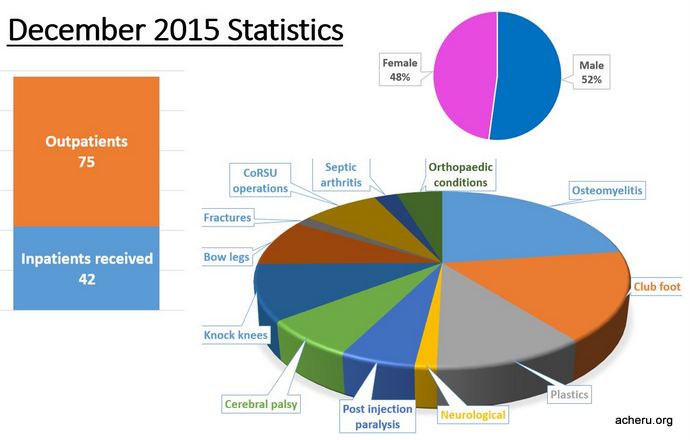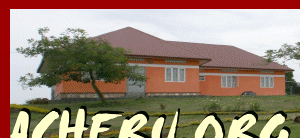|
|
| January 2016
Report |
| Brian Dorman reports: |
| For the next three months Hazel and I will be in South Africa. We're in the Western Cape,
in an area which has become like a second home for us, staying near Alan Clegg who worked at Besaniya and was instrumental in the planning
of Cherub, and oversaw the building work. We've enjoyed some relaxation in the sunshine, but are also able to get on with whatever work
Africare requires. We've links to a church here and are taking an interest in several charitable projects working with severely disabled
children and abandoned babies. Philip continues to deal with Africare finances, but please be aware that anything requiring a reply from
me might have to wait. However we are still contactable by email. |
| There was a quieter period for Acheru as most people associated with the work take their main
holiday over Christmas and New Year, including surgeons and staff at CoRSU, so fewer children are operated on. This is less disruptive than
everyone taking their holidays at different times. It's easier to plan the work when most people are off at the same time. Where possible,
Acheru children go home for Christmas though of course some staff must remain at Acheru to provide care for children who don't have that
option. |
| I was sorry to hear that Charles, the Acheru physiotherapist, has left to take up full time
ministry. He also sings, and I've been impressed by some of the recordings of gospel music he has produced. His enthusiasm for the work
will be missed, and interviews are now underway to find a replacement. For a small unit like Acheru it's important that they find someone
not only with the necessary skills, but who can fit in as part of the team. Most staff stay on site, so they must live together as well as
work together. |
| Work continues on the remaining parts of Acheru development, which we were able to send out
money for some time ago. A small building is now almost completed, incorporating a sterilizing room, and a workshop for the community based
rehabilitation programme. This will be used under Harriet's direction to produce appliances such as cerebral palsy chairs or mobility aids
for children she visits as part of the community programme. It's worth reminding ourselves of the importance we place on getting a disabled
child upright, enabling them to look people in the eye and engage with them in a way which wasn't possible when they were on the ground and
easily ignored. The consequent change in people's perception of them is a significant step. |
| We don't envisage any further increase in the size of Acheru, but can certainly see potential
for growth in the community work, finding more children in need of treatment and supporting families living in poverty and struggling to care
for a disabled child. |
| We had also sent out money for a pumped water supply. A bore hole was drilled for us by Fields
of Life, but a water source could only be found outside our site, so it's shared with a school. Acheru collects rainwater for storage in
underground tanks and for much of the year this is adequate for our needs. During dry periods water must be carried from a well or delivered
by tanker, so a bore hole is valuable. It is at present fitted with a hand operated pump which means the water still has to be carried to
Acheru but the aim is to fit an electric pump, with a piped supply to Acheru. Because it's a shared system with the school, and electricity
lines or water pipes may cross other people's property, the necessary agreements must be finalised. This all takes time, but having a good
supply of water at all times means a lot to Acheru. Water is a valuable resource so we also want to ensure that as much rainwater as possible
is harvested from all the Acheru roofs, and that waste is avoided through effective control of distribution and use. |
| Although we don't plan any further development, I'm sure there will always be scope for
improvements to the buildings and facilities, helping us to provide the best possible environment for the work of the staff and the care
and treatment of the children. A lot of effort goes into the presentation of Acheru, and the grounds look good with flowers and hedges
edging the paths. The impression Acheru gives to visitors is important as they develop partnerships, and there has been recent help from
several organisations with gifts of wheelchairs and food supplements. |
| We don't yet know the effects of drought in northern Uganda. The situation in Southern
Sudan is very serious, with failed crops and many deaths. The combined effects of drought and violence leaves 4 million people at risk
of starvation. We're fortunate that Kabembe is located in a fertile area. It can still be affected if the rains are late and there's
a prolonged dry spell, but the north is very different and delayed rains there can have a huge impact. Over the border in Sudan average
rainfall has fallen significantly over the last 60 years, with an increase in variability. |
| In subsequent reports I hope to give you more information on day to day life in Acheru,
and stories of individual staff members. |
| Brian Dorman |
 |
|
|
|



